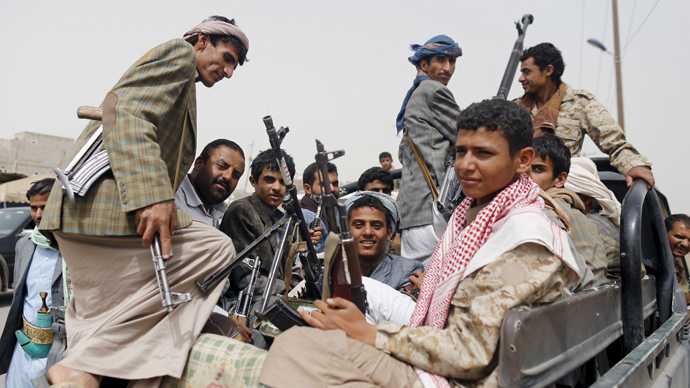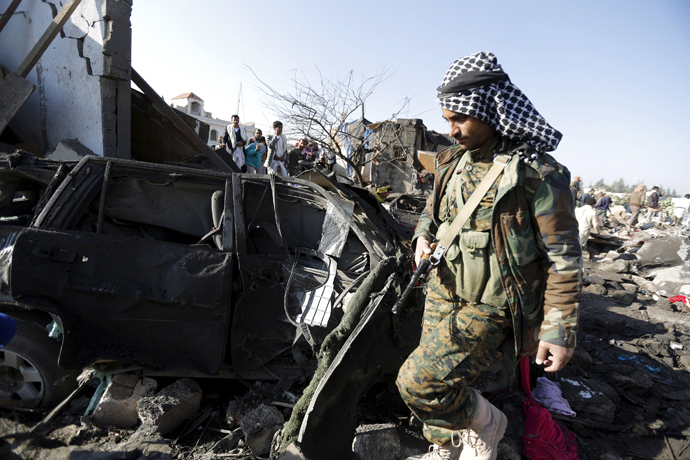‘Saudi Arabia airstrikes pave way for ground invasion of Yemen’

The strategic agenda of Saudi Arabia’s bombing of Yemen is to prepare for a ground operation by disabling the Houthis’ military might and getting them to withdraw from military bases, Yemen-based journalist Yousef Mawry told RT.
RT:During the Arab League Summit in Egypt, the Saudi King said the air strikes will continue until peace and stability are restored in Yemen. Is that objective achievable?
Yousef Mawry: It depends on how you define peace and stability. Saudi Arabia believes that peace and stability can only come once a puppet regime is installed to rule over the affairs of the country, a puppet regime which will be loyal and cater to its interest. Whenever there is an uprising that poses a threat to the Saudi meddling in Yemen we always see the Saudi intervention which aims to bring an end to such uprisings.
Firat Demir, Middle East analyst, Associated Professor, University of Oklahoma on the situation in Yemen: “There is no doubt that Iran wants to extend its influence in the region through their networks within the Shia community but there is no evidence that Iran is providing either logistical support or sending advisors to the Houthi rebels within Yemen.”
If you recall the 2011 revolution, protesters took to the streets calling for anti-Saudi intervention. [In] the 2014 revolution by the Houthi movement they took to the streets chanting slogans of anti-US intervention and especially that of Saudi Arabia. The 2011 revolution did not succeed, it was sabotaged because political parties decided to go to Saudi Arabia to sign a deal which handed power over to Abd Rabbuh Mansur Hadi, President Ali Abdullah Saleh’s deputy.
The Houthi movement remained in Liberation Square in Sana’a; it remained calling for anti-Saudi meddling in Yemen’s internal affairs. This was the revolution which took place in 2014 [when] Houthis advanced from the northern province of Saada all the way to the Yemeni capital. Many people did not expect them to take such a journey. However, they were successful because they were able to meet most of the aspirations of the Yemeni people which call for anti-Saudi meddling and call for the building of a sovereign, independent Yemen which will pave the way for the better future for all Yemenis. And that can only be done once we, according to the Houthis, cut the hands of the Saudi meddling in Yemen’s internal affairs.
I want to just mention that according to the great-grandfather of the Saudi family… and this is documented, that the stability of Saudi Arabia will only come if Yemen remains in a state of chaos and instability, and the Yemeni people remain in a state of poverty. This is the agenda of Saudi Arabia.
Firat Demir, Middle East analyst, Associated Professor, University of Oklahoma on the situation in Yemen: “If the Arab League forms a joint military force, who are the real targets here? They have quite diverse interests. In the long-run I don’t see this to be a viable option for stability in the region. In the short-run it is a necessity from the ruling elites against the growing influence of the al-Qaeda and ISIS threat in the region, and secondly against growing influence of Iran.”

RT:Saudi Arabia is ready to provide 150,000 troops for a ground operation, the majority of its army. Are the Saudis going all-in for a fully-fledged war?
YM: That is exactly what is taking place right now. The coalition bombardments…seem to be strategic airstrikes which have two goals, one of which is to disable or to weaken the Houthis’ military might. Their second goal is to get the Houthis to withdraw from the military bases which were considered to be the government’s prior to September 2014. And this seems to be a strategic agenda in order for them to pave the way for a ground invasion. And we’ve had Saudi officials mention that they are ready to deploy 150, 000 troops on the border of Saudi Arabia near the North province of Saada – the Houthis’ stronghold. The Houthis look to counter this ground invasion by entering Saudi territory. This is a plan by the Houthis; this is in preparation by the Houthi movement. They believe that the only way they can get Saudi Arabia to pull back its airstrikes and to prevent them from a ground invasion is to take the fight to the Saudi monarchy to give them a taste of their own medicine.
The statements, views and opinions expressed in this column are solely those of the author and do not necessarily represent those of RT.
The statements, views and opinions expressed in this column are solely those of the author and do not necessarily represent those of RT.












